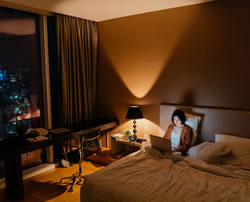Marisa Sanfilippo* says bosses weaken their employees’ work-life balance and job performance when they create expectations that work emails should be monitored and responded to during non-work hours.
 While you may think it increases productivity to have your employees respond to emails after work and on weekends, encouraging them to stay in constant communication actually hurts their job performance, research suggests.
While you may think it increases productivity to have your employees respond to emails after work and on weekends, encouraging them to stay in constant communication actually hurts their job performance, research suggests.
Employers damage their employees’ well-being, work-life balance and job performance when they create expectations that work-related emails should be monitored and responded to during non-work hours, according to an Academy of Management study.
To identify and prevent employee burnout, business owners and managers should be aware of the downside of employees being available constantly.
Dangers of always being readily available through email
“An ‘always-on’ culture with high expectations to monitor and respond to emails during non-work time may prevent employees from ever fully disengaging from work, leading to chronic stress and emotional exhaustion,” the Academy of Management study’s authors wrote.
Here’s a look at the major negative repercussions of employees who engage in after-hours email communication.
Higher employee stress
It’s the time or effort required to respond to emails that matter, but rather the expectation that employees should work after hours.
“Organisational expectations are the main culprit of individual inability to disconnect,” the authors wrote.
“Even during the times when there are no actual emails to act upon, the mere norm of availability and the actual anticipation of work creates a constant stressor that precludes an employee from work detachment.”
The researchers conducted surveys of 600 working adults recruited from a business school alumni association and from LinkedIn interest groups; participants’ jobs spanned various industries and organisations.
The first survey asked how many hours a week participants devoted to after-hours emails, the expectations their employer had for them to respond to emails after work, their levels of psychological detachment from work and emotional exhaustion, and how they felt about having to consider work issues while at home.
A follow-up survey a week later inquired about their work-life balance.
The study’s authors discovered that the participants spent an average of eight hours a week reading and responding to company-related emails after hours.
However, the expectation that they must respond to emails caused the most significant issues.
“Diminished work detachment due to email-related overload is not necessarily caused by the time spent on handling the work email, but instead is strongly tied to anticipatory stress caused by organisational expectations,” the authors wrote.
This diminished ability to disconnect from work translates to a poorer work-life balance and causes emotional exhaustion, which earlier research has shown to affect job performance negatively.
Increased risk, decreased productivity
Multitasking is often thought of as a way to get more done, but studies show that switching between tasks is actually a productivity killer.
An American Psychological Association study on multitasking revealed that juggling multiple duties at once – for example, working on a project and checking email – causes overall productivity and efficiency to plummet.
When you switch from one task to another, your brain takes time to shift to the new task’s demands, potentially leading to errors.
While switching between minimal-concentration tasks, such as watching TV and folding laundry, isn’t likely to lead to a disaster, doing too much at once, such as caring for your family while answering important work emails, can shortchange everyone involved – especially you.
Here’s another, more concrete aspect to consider: If an employee is frequently contacted outside of the office, they may be tempted to check email while driving or while engaged in another risky situation, which puts themselves and everyone around them in harm’s way.
A study on workers’ email habits reveals that 10 per cent of employees reported constantly checking their emails outside of their daily work hours.
That means while they were driving, cooking, and spending time with their families, they were multitasking in a way that made them less engaged and potentially put them at risk.
Lack of work-life balance
The adverse effects of feeling the need to respond to after-hours emails were most significant for employees who strongly wished to keep their work and family lives separate.
While family-oriented employees are more likely to detach from work than those who don’t care as much about work bleeding into their personal lives, the insistence on after-hours email availability impedes their good intentions, leading to frustration.
The Academy of Management study’s authors believe that employees who aren’t as concerned about keeping their work and personal lives completely separate may actually have an easier time disconnecting since their preferences don’t conflict with their companies’ expectations.
Tips to avoid checking email after work
To improve productivity and achieve a better work-life balance, employees must be proactive about not checking email after hours.
Here are some best practices for employees and managers alike to follow.
- Turn off push notifications.
Consider disabling push notifications on your mobile device, which may alert you every time you receive an email, Slack message, instant message, or other forms of communication.
There’s no need to receive an instant alert every time you receive a new email.
If you’re worried about missing an important communication, set up your push notifications to inform you of emails or messages only from those on your VIP list.
- Boost productivity by closing browser tabs.
When you’re on your tablet or computer after work, avoid leaving your email application open.
Close Facebook, Slack and other messaging channels as well.
Although you may be used to multitasking, you could actually be wasting time by having too many windows or tabs open, drawing your focus and causing you to get off track.
Instead, establish a schedule for checking emails.
For example, check email and other messages only every two hours while at home, or make a point of signing off at a particular time.
- Set screen time limits.
Eliminating screen time is a good way to get a break on the weekends.
For instance, you could make a goal of having “unplugged Sundays,” where you avoid looking at any electronics for the entire day.
You can also consider checking email only once over the weekend.
How employers can help employee wellness
Employers want healthy, happy employees and a productive business.
While industries vary widely, it’s essential to set boundaries and explain your expectations for employees’ after-hours availability.
It’s also vital for employers to consider the legal ramifications of after-hours work.
According to law firm Foley & Lardner LLP, emails may be considered compensable for nonexempt employees.
If you’re paying an employee for only 40 hours, you may face issues if you expect them to work after hours to respond to incoming emails.
To prevent any problems, and to boost employee morale, consider setting up your email server to allow emails to be sent only during regular business hours.
You could also implement policies about email communications, including what times are acceptable to send and receive work-related messages.
Outline your policies and expectations clearly in your employee handbook.
By encouraging employees to be less available by email during their off hours, employers not only promote a healthier work-life balance for their employees, but also help them reduce stress, which can ultimately increase job satisfaction and performance.
*Marisa Sanfilippo is a contributor at Business News Daily.
Chad Brooks contributed to the writing and reporting in this article.
This article first appeared at businessnewsdaily.com.











